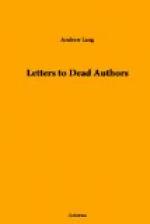The grave of Piers Cockburn is still not desecrated: hard by it lies, within a little wood; and beneath that slab of old sandstone, and the graven letters, and the sword and shield, sleep ‘Piers Cockburn and Marjory his wife.’ Not a hundred yards off was the castle door where they hanged him; this is the tomb of the ballad, and the lady that buried him rests now with her wild lord.
Oh, wat ye no my heart was
sair,
When I happit the mouls on
his yellow hair;
Oh, wat ye no my heart was
wae,
When I turned about and went
my way! (1)
Here too hearts have broken, and there is a sacredness in the shadow and beneath these clustering berries of the rowan-trees. That sacredness, that reverent memory of our old land, it is always and inextricably blended with our memories, with our thoughts, with our love of you. Scotchmen, methinks, who owe so much to you, owe you most for the example you gave of the beauty of a life of honour, showing them what, by Heaven’s blessing, a Scotchman still might be.
(1) Lord Napier and Ettrick points out to me that, unluckily, the tradition is erroneous. Piers was not executed at all. William Cockburn suffered in Edinburgh. But the Border Minstrelsy overrides history.
Criminal Trials in Scotland by Robert Pitcairn, Esq. Vol. i. part I. p. 144, A. D. 1530. 17 Jac. V.
May 16. William Cokburne of Henderland, convicted (in presence of the King) of high treason committed by him in bringing Alexander Forestare and his son, Englishmen, to the plundering of Archibald Somervile; and for treasunably bringing certain Englishmen to the lands of Glenquhome; and for common theft, common reset of theft, out-putting and in-putting thereof. Sentence. For which causes and crimes he has forfeited his life, lands, and goods, movable and immovable; which shall be escheated to the King. Beheaded.
Words, empty and unavailing—for what words of ours can speak our thoughts or interpret our affections! From you first, as we followed the deer with King James, or rode with William of Deloraine on his midnight errand, did we learn what Poetry means and ali the happiness that is in the gift of song. This and more than may be told you gave us, that are not forgetful, not ungrateful, though our praise be unequal to our gratitude. Fungor inani munere!
XVI.
To Eusebius of Caesarea.
(Concerning the Gods of the Heathen.)
Touching the Gods of the Heathen, most reverend Father, thou art not ignorant that even now, as in the time of thy probation on earth, there is great dissension. That these feigned Deities and idols, the work of men’s hands, are no longer worshipped thou knowest; neither do men eat meat offered to idols. Even as spoke that last Oracle which murmured forth, the latest and the only true voice from Delphi, even so ’the fair-wrought court divine hath fallen; no more hath Phoebus his home, no more his laurel-bough, nor the singing well of water; nay, the sweet-voiced water is silent.’ The fane is ruinous, and the images of men’s idolatry are dust.




